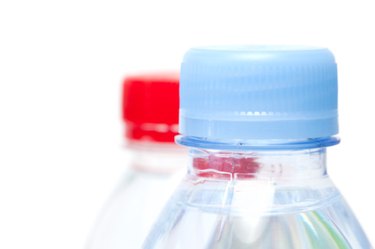
Giardiasis is an intestinal infection by a parasite known as Giardia lamblia. Giardia is the most common parasite to infect travelers in places with unsanitary conditions, according to Drugs.com. It also affects those who drink unclean water while camping or who unintentionally swallow some when swimming or rafting in rivers or lakes. If you become infected with giardia, ask your doctor or dietitian whether you need a special diet in addition to medication, recommends Drugs.com.
Effects
Video of the Day
During giardiasis, the parasite attaches to the lining of the small intestine, causing diarrhea and other symptoms, explains Drugs.com. Some people experience fever, abdominal pain, nausea and vomiting. Diarrhea and vomiting can lead to dehydration. A doctor diagnoses giardiasis with blood or stool tests.
Video of the Day
Fluid Replacement
A primary goal of dietary treatment for giardiasis is replacing fluid to prevent dehydration, according to Drugs.com. Men should drink about 100 oz. of liquid each day and women about 68 oz. You can count beverages that contain caffeine. Drink even more fluid if you exercise or are outdoors in the sun for a long time. Fluids containing water, sugar and salt are best, as they help your body retain fluid. Rehydration drinks, such as Pedialyte or Lytren, are available for children and adults experiencing severe diarrhea. Give children up to 1 cup of a rehydration drink per hour, and they also may have the drink in frozen pops form. You also can make a rehydration drink for children with 1 qt. purified water, 2 tsp. table sugar, 1/2 tsp. salt and 1/2 tsp. baking soda. Children with giardiasis should not drink undiluted sports drinks, soft drinks or fruit juice, advises Diet.com.
Specifics
Dietary therapy during recovery may include mild foods such as plain boiled rice, applesauce, dry toast and saltine crackers, according to Diet.com. After a few days, begin eating a variety of healthy foods, including whole-grain bread, cereal, rice and pasta, along with lean meat and fish, eggs and fruits and vegetables. You should not consume spicy foods, dairy foods, citrus fruits, alcohol or caffeinated drinks for two to three days after the symptoms have disappeared.
Considerations
Up to 40 percent of adults develop a temporary intolerance to the milk sugar lactose after having giardiasis, according to Diet.com. It may last for about a month after treatment with medication. If you become lactose intolerant, avoid all dairy products for a month and then reintroduce them into your diet gradually. In the meantime, try soy milk, rice milk or almond milk, or lactose-free dairy products.
Prevention
Dietary therapy for giardia infection also involves preventing the spread of the disease, notes Diet.com. In areas with questionable water supplies, only drink bottled water and canned or bottled beverages with no ice. Do not eat raw fruits or vegetables in these areas if they may have been washed in unclean water. Always wash your hands after touching anything in a bathroom, particularly in places where giardia is easily spread, such as daycare centers and nursing homes.